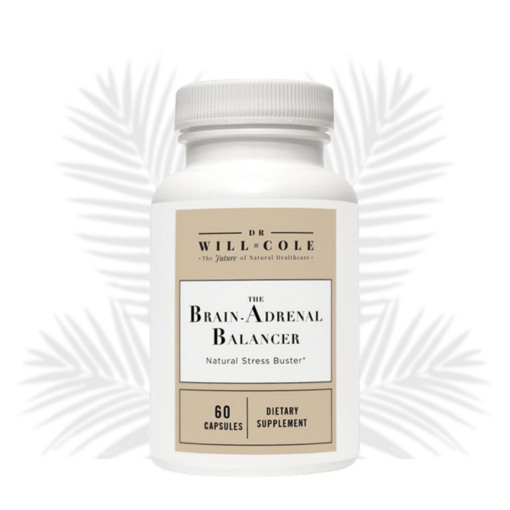The 6 Best Supplements To Support Optimal Brain Health + Cognitive Function

If you’re a health-conscious person, I’d bet my savings that you spend a good portion of your time thinking about your physical health. You probably drink smoothies, hydrate, exercise, and moisturize all with the goal of optimizing your physical health.
So many of my patients have been experiencing brain fog, mood swings, and trouble focusing on work, parenting, and even things as simple as ordering groceries. And it makes sense. We’ve all gone through a collective trauma and it’s normal to feel distracted, anxious, or a bit “up and down.”
But the next question is: How do you get rid of brain fog? Is there anything you can do to support your brain health, especially during times of chronic stress when it suffers? I coach my patients all the time on optimizing brain health through a combination of diet and lifestyle changes. In my book Intuitive Fasting, I have a whole section on why time-restricted feeding can help optimize brain health and may even prevent brain-related diseases from cropping up in your future.
ARTICLE CONTINUES BELOW
But there are also a group of supplements for brain fog that can make a BIG difference. So while I believe that our diet is foundational, sometimes we need a little extra help. These are the supplements I turn to the most often to help optimize brain health and function.
Best Supplements + Vitamins for Brain Fog
1. Lion’s Mane for mental clarity
Lion’s mane is an adaptogenic mushroom that has demonstrated potent neuroprotective properties.That is what makes this one of the best supplements for brain fog. I often suggest this mushroom to patients that would like to enhance mental clarity and boost cognitive function. Lion’s mane contains nerve growth factors that work to protect and regenerate brain tissue with studies finding that those who supplemented with lion’s mane had higher cognitive function compared to those who didn’t. (1)
How to take Lion’s Mane: Ideal dosage is 750mg per day.
There are also other adaptogens like ashwagandha and rhodiola that support the brain-adrenal axis for increased energy and mental clarity. I personally curated The Brain-Adrenal Balancer with a curated blend of clinically tested and proprietary herbal blends and nutrients - including ashwagandha - to help the overstressed body and mind work toward their normal state of balance.
2. Omega-3s for general brain health
If there’s one super-ingredient for your brain, it’s fat. Why? Because your brain is 60 percent fat! It only makes sense that not getting enough fat in your diet can contribute to brain problems and that healthy fats — like those found in fatty fish, avocado, and olive oil — can support your brain health. I recommend fish oil supplements derived from krill, salmon, or sardines to almost all my patients for general brain health support.
How to take omega-3s: The ideal dosage is 2250mg EPA / 750 mg DHA per day.
3. Vitamin D for memory
What vitamins help with mental fog? The one whose low levels have been linked to poor memory and other brain fog symptoms.(2) What’s even crazier is that a LOT of people are deficient in this important vitamin. This is because vitamin D isn’t found in that many foods — in fact, sunshine is the most bioavailable source of this nutrient. As you can guess, it’s not always easy to spend time in the sun, especially in the winter, which is why I often recommend vitamin D supplements for brain fog.
How to take vitamin D: Ideal dosage varies based on vitamin D levels but generally, I recommend at least 2000 IUs of vitamin D3 per day.
4. St. John’s Wort for mood
If you’re dealing with mood ups and downs, St. John’s Wort might be worth a try. This herb is recommended by doctors more often in Germany than antidepressants like Prozac! And while long-term studies have shown its ability to stabilize mood, more research needs to be done to better determine just how effective it is. (3)
How to take St. John’s Wort: Ideal dosage is 300 mg three times a day.
5. CoQ10 for brain fog
Another one of our favorite supplements for brain fog, CoQ10 stands for coenzyme Q10, which is an enzyme found in every cell in the body but especially in the mitochondria, which are the energy centers of the cells. If your brain’s cells are lacking this nutrient, chances are it isn’t going to function optimally. In fact, a study in the Journal of Clinical Psychopharmacology found that in 18 people with depression, taking CoQ10 for a month decreased the severity of depression symptoms and significantly improved symptoms of fatigue, sadness, and brain fog. (4)
How to take CoQ10: Ideal dosage based on the study mentioned above is 400 to 800 mg/day.
6. Probiotics for the gut-brain axis
If I’ve learned anything through my years in functional medicine, it’s that the gut is at the center of our health. Brain health is no exception to this rule, either. The gut-brain axis has been well-established; for example, occludin and zonulin are two proteins that govern gut permeability as well as the permeability of your blood-brain barrier. (5) It’s not uncommon at all for someone to come into my clinic looking for help with depression or brain fog and have further diagnostic testing reveal that they also have a leaky gut syndrome. It just goes to show that digestive problems can still be a factor even if you aren’t experiencing symptoms. That's why I always recommend a probiotic for all of my patients.
How to take probiotics: I recommend taking a probiotic with Lactobacillus and Bifidobacterium and at least 50 billion CFUs once a day.
If you’re feeling a little more sluggish and foggy-brained this year, you’re not alone. The good news is that there are plenty of lifestyle practices — including the supplements above! – that can help you feel sharper, more positive, and clear-headed.
As one of the first functional medicine telehealth clinics in the world, we provide webcam health consultations for people around the globe.
Photo: unsplash.com
Read Next: Can Supplements Help With Menopause? Let’s Talk About It And 16 Of My Top Picks
Start Your Health Journey Today
FUNCTIONAL MEDICINE CONSULTATIONS FOR PEOPLE AROUND THE WORLD
References:
- Mori K, Inatomi S, Ouchi K, Azumi Y, Tuchida T. Improving effects of the mushroom Yamabushitake (Hericium erinaceus) on mild cognitive impairment: a double-blind placebo-controlled clinical trial. Phytother Res. 2009 Mar;23(3):367-72. doi: 10.1002/ptr.2634. PMID: 18844328.
- Wilkins CH, Sheline YI, Roe CM, Birge SJ, Morris JC. Vitamin D deficiency is associated with low mood and worse cognitive performance in older adults. Am J Geriatr Psychiatry. 2006 Dec;14(12):1032-40. doi: 10.1097/01.JGP.0000240986.74642.7c. PMID: 17138809.
- Linde K, Berner MM, Kriston L. St John's wort for major depression. Cochrane Database Syst Rev. 2008 Oct 8;2008(4):CD000448. doi: 10.1002/14651858.CD000448.pub3. PMID: 18843608; PMCID: PMC7032678.
- Forester BP, Harper DG, Georgakas J, Ravichandran C, Madurai N, Cohen BM. Antidepressant effects of open label treatment with coenzyme Q10 in geriatric bipolar depression. J Clin Psychopharmacol. 2015;35(3):338-340. doi:10.1097/JCP.0000000000000326
- Martin CR, Osadchiy V, Kalani A, Mayer EA. The Brain-Gut-Microbiome Axis. Cell Mol Gastroenterol Hepatol. 2018;6(2):133-148. Published 2018 Apr 12. doi:10.1016/j.jcmgh.2018.04.003
View More At Our Store
Purchase personally curated supplements
and Dr. Will Cole’s books!

The information on this website has not been evaluated by the Food & Drug Administration or any other medical body. We do not aim to diagnose, treat, cure or prevent any illness or disease. Information is shared for educational purposes only. You must consult your doctor before acting on any content on this website, especially if you are pregnant, nursing, taking medication, or have a medical condition.
Our content may include products that have been independently chosen and recommended by Dr. Will Cole and our editors. If you purchase something mentioned in this article, we may earn a small commission.

BY DR. WILL COLE
Dr. Will Cole, DNM, IFMCP, DC is a leading functional medicine expert who consults people around the globe, starting one of the first functional medicine telehealth centers in the world. Named one of the top 50 functional and integrative doctors in the nation, Dr. Will Cole provides a functional medicine approach for thyroid issues, autoimmune conditions, hormonal imbalances, digestive disorders, and brain problems. He is also the host of the popular The Art of Being Well podcast and the New York Times bestselling author of Intuitive Fasting, Ketotarian, Gut Feelings, and The Inflammation Spectrum.

Gut Feelings
Healing The Shame-Fueled Relationship
Between What You Eat And How You Feel



